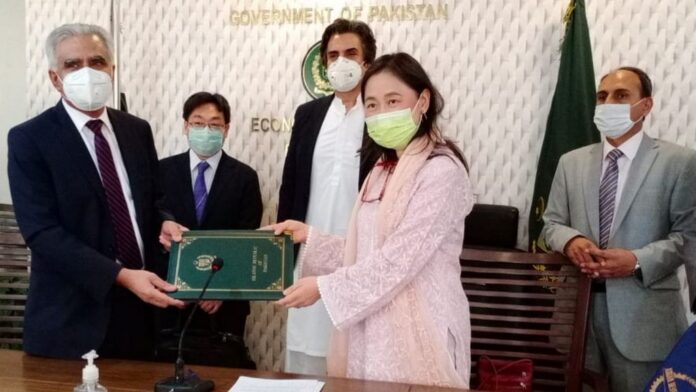The Asian Development Bank (ADB) and Pakistan have signed a $235 million loan agreement, initially approved by the bank on 5th July 2019, to help develop a bus rapid transit (BRT) system in Karachi.
Economic Affairs Division Secretary Noor Ahmed and ADB Country Director Xiaohong Yang had signed the said agreement yesterday, according to a statement issued by ADB on Saturday.
“The project will help deliver the 26.6-kilometre (km) BRT Red Line corridor and feature innovative energy and climate resilience characteristics that will enhance access to quality public transport for the harbour city,” the statement read.
The signing ceremony was witnessed by Economic Affairs Minister Makhdum Khusro Bakhtyar.
“The project will bring a safe, reliable, and environmentally friendly mode of transport to Pakistan’s most populous city,” said Ms Yang. “On behalf of ADB, I would like to thank the Sindh government for strong collaboration and continued support during the preparation of this complex project. The BRT will significantly improve the commuting experience in Karachi, as it would ease congestion and improve the overall quality of life for people.”
The project, developed and designed in partnership with the Transport and Mass Transit Department of the Sindh government, is currently going through procurement of civil works and services.
The project will restructure the entire width of the Red Line BRT corridor, including the construction of 29 stations and dedicated lanes along the 26.6km stretch; improvement of the mixed-traffic roadway with up to six lanes in each direction; inclusion of organized parking facilities and landscaped green areas in various locations; improvement of the drainage system to climate-proof the corridor; and installation of bicycle lanes, improved sidewalks, and energy-efficient street lights.
In addition, the ADB would administer a $71.8 million loan from the Asian Infrastructure Investment Bank; a $71.8 million loan from Agence Française de Développement; and a $37.2 million loan grant from the Green Climate Fund (GCF), which will finance climate change adaptation and mitigation measures, such as the incremental cost of the transition to compressed natural gas (CNG) hybrid bus technology.
It will also administer a GCF grant of $11.8 million for the construction of a biogas plant to produce CNG from cattle waste. The project, which is expected to save 240,000 tonnes of CO2 emissions per year, is the first transport-related initiative approved by GCF.





Misplaced priorities. Existing roads are in shambles, repairing these will cost much less. Spend on water supply and sewage following all over.
Public transportation for the masses should be a higher priority than fixing roadways for the wealthy few with private cars and the transportation mafia
Roads are for all private card as well as public transport. Roads are in worst conditions in poorer areas where few car owners go. For masses we need more buses on existing roads not new roadways.
Definitely believe that that you stated. Your favorite justification seemed to be at the net the easiest
factor to keep in mind of. I say to you, I certainly
get annoyed while people consider worries that they just don’t recognize about.
You controlled to hit the nail upon the top and defined out the entire thing without having side-effects , folks can take a
signal. Will probably be back to get more. Thank
you